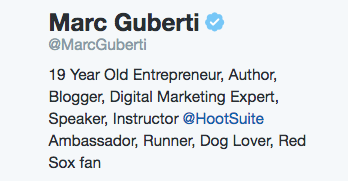Have you ever bought something simply because someone you know recommended it? I’m sure you have. But while this behavior might seem trivial on the surface, underneath lies one of the greatest truths about social media marketing, and marketing in general.
We often rely on our friends to get product recommendations. After all, we know and trust our friends. More importantly, they know us. If you’re an avid reader, for example, your friends won’t likely recommend a good baseball glove. Rather, they’ll recommend a good book.
Having said that, one way to describe marketing is product recommendation. Even when we are trying to sell a product, we are, in essence, recommending it. Some messages are crafted better than others but, in the end, we don’t actually sell products. We recommend them. It’s the customer who takes action.
Part of making a great recommendation is to know your customers as well as you know your friends. It’s easy to recommend something to a lifelong friend. Imagine if it was just as easy to make recommendations for your potential customers. Now imagine if your potential customers responded the same way as your friends.
That’s possible, but only when you learn as much as you can about your customer. And social media can help you extract the information you need. Once you learn more about your customers through social media, you’ll get more sales and generate more revenue.
Let’s get started!
#1: See What Your Customers Share
You can learn A LOT about a person just by what they share on social media. For instance, I share blog posts about productivity, digital marketing, and blogging. Whether you believe I’m an expert on those subjects or not, you know right away that I care about those topics.
I’m interested in getting more traffic from my digital marketing efforts. I want to boost my productivity. And I want to write killer blog posts. And no matter how much I improve my skills, I’ll always want to do better.
Take a look at what your customers are sharing on social media. They share the products they like using, the articles and information they find interesting, and they often share how they feel about certain people and issues.
If a majority of my Twitter followers started sharing Pinterest-related articles, my next training course would be about Pinterest. See what I mean? When you know people already want something, offer them relevant solutions and your product recommendations will carry more weight.
#2: Read Their Bios
A bio can say a lot about a person. For instance, here’s my 160 character bio on Twitter:
Based on my tweets, you know that I care about social media marketing, blogging, and digital marketing (note: I don’t say that I’m passionate about them because people don’t always share what they’re passionate about, but they always share what they care about).
Looking at my bio, you also know I’m a runner, dog lover, and Red Sox fan. Do you offer a DVD workout routine that helps me cut 10 seconds off my mile within 30 days? If so, I’m all ears. And if you recommend something that will make my dog love me even more, you have my attention.
If you have some epic Red Sox memorabilia, I’m listening to you. I will not listen to anyone who offers Yankees memorabilia (unless it has something to do with Derek Jeter or Mariano Rivera). Likewise, if you’re selling a cat bowl, you will lose my attention immediately.
Doing this type of homework lets you discover what to recommend, and what not to recommend, to your customers. Depending on what you offer, and the information you provide in your bio, you can offer something that appeals to multiple interests.
If you recommend a Red Sox dog costume, you’ve won my heart. Envisioning my dog in a Red Sox outfit satisfies my love for dogs and my desire to watch the Red Sox win another World Series (and then another one. That cycle of desire will continue forever).
#3: Look At Who Your Customers Follow
Almost every social network lets you to discover who your customers are following. From a marketing perspective, we aren’t concerned about every individual a customer follows. We are more concerned with patterns.
Are your customers following accounts that post inspirational quotes? Are they following social media influencers? Understanding these common patterns will allow you to identify which recommendations will resonate strongest with your customers.
Now I’m going to share a trick to ensure your audience will become more receptive to your recommendations. Let’s say I want an audience consisting of people who follow other social media influencers.
These people were interested in social media marketing before I discovered them. Following them, and getting them to follow me back, will result in more individuals who will see my recommendations and potentially take action.
#4: See How Your Audience Engage With Your Content
If you follow an influencer’s followers, you are more likely to grow an audience. Combine that with the above-mentioned tips and you’ll grow a targeted audience.
But even when you have a targeted audience, you won’t FULLY understand what they want. If your audience is interested in social media, for instance, you may not know which social network they use most. But there are two ways to figure this out:
- Conduct a survey and ask your audience to fill it out (keep in mind this method works better with an email list).
- Examine how your audience engages with your social media content.
A few years ago, I noticed that my Twitter and blogging-related content received the most retweets. That’s why my first training courses were about Twitter and blogging.
Then I saw increased engagement for my productivity and social media-related blog posts (social media in general, not specific networks).
Therefore, I created more training courses about productivity and social media. The more often you share content on social media, the more data you’ll have to play with. Having more data to play with always allows you to make more accurate conclusions.
In Conclusion
Speaking of conclusions, you’ve reached the near-end of this blog post. Understanding your customers allows you to provide products and services that your customers will buy before you even say a word.
So far, social media is the most revolutionary marketing tool of the 21st century. While we’ve learned many methods of social media marketing, we still have much to learn. The evolving trends in social media marketing will be very exciting.
Regardless of how marketing evolves, the emphasis will always revolve around knowing your customer. By knowing your customer like you know a friend, you can make recommendations that result in happy customers and more revenue that you can use to expand your business.
What are your thoughts on using social media to learn more about your customers? Have any tips for us? Sound off in the comments section below.




